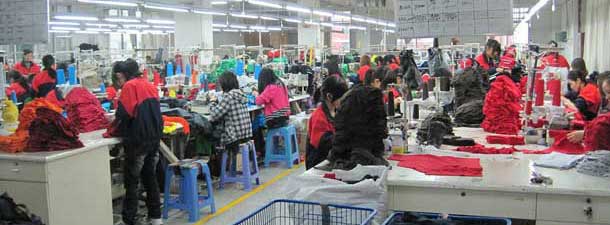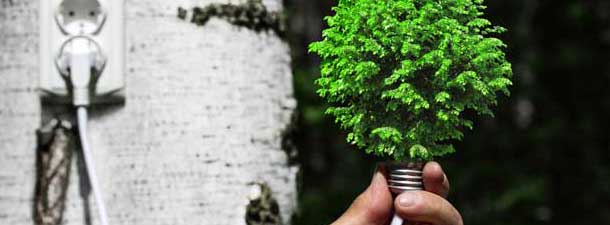
Germany’s Green Tech: The Rise – and Fall? – of an Industry
September 3, 2012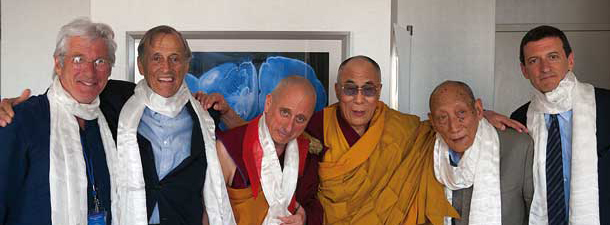
The Unlikely Abbot
September 3, 2012It is more apparent than ever that our lifestyles today, particularly in the West, are environmentally unsustainable. But “sustainability” seems to be a word that slips easily past one’s lips. What does it even mean? Is it even possible to achieve it? The utter inaction of governments would lead one to think not. But it is actually a simple concept and there are companies out there – though right now there may be only a few – who are well on the way to achieving it. Maylasia’s Nukleus is one of them.
T
Today’s market place is flush with brands. It seems that everyone and everything is branded. Does the world really need more brands?
Before we answer that question, we first need to consider a different one: What are the most critical issues the world is facing today?
Sustainability immediately comes to my mind. Of course, not everyone sees it this way. Writing this article has coincided with the conclusion of the United Nations Conference on Sustainable Development in Rio de Janeiro, though the conference looks like it is far from delivering what we need. The writer George Monbiot says the Rio Conference is “perhaps the greatest failure of collective [political] leadership since the First World War.” He may not be too far off the mark. The evidence: only one G8 leader – François Hollande of France -showed up. Business leaders, on the other hand, attended. Paul Polman, the CEO of Unilever, was there and was vocal. (Unilever is known for its award-winning “Sustainable Living Plan”.) So was Jochen Zeitz, the CEO of Puma, who talked about his company’s revolutionary environmental profit and loss accounting.

Nukleus factory
Sustainability – it’s become a very big buzzword. Politicians use it. Business people use it. Even schoolchildren use it. But what is it, actually? Put simply, it’s about satisfying our present needs without compromising the ability of future generations to satisfy theirs, as defined by the Brundtland Commission in 1987. Our very basic needs – food and water – are supplied by Mother Nature. If we don’t take good care of her, we jeopardise the future of humanity.
Sadly, the World Wide Fund for Nature (WWF) informs us that we are not living sustainably. According to the 2012 edition of its Living Planet Report, WWF estimates that we are using 1.5 planets to support our current lifestyles. This means we are working Mother Nature very, very hard. And if we don’t change, we will need two planets by 2030. As far as I know, we only have one! So what should we be doing?
There is one thing all of us can and should do: we can consume sustainably. Making the right consumer choices has never been more important than it is right now. As consumers, we must realise that everything we do impacts the planet in one way or another. For this reason, every single act of ours counts!
Here’s where businesses can make a difference. They can provide consumers with smart, sustainable options. And this will often entail the creation of new brands with new ways of doing things.
So we ask again: Does the world need more brands? The short answer is “yes” – but specifically, the world needs brands that offer genuinely sustainable solutions.
Let’s consider a hypothetical: using the finest eco-friendly materials in the world, a conventional clothing company creates a new clothing line. It then makes a decent-sized donation to a reputable non-governmental organisation involved in environmental conservation. Finally, it declares to the world it is a sustainable clothing company because of its actions. But do its actions genuinely contribute to sustainability?
To be sure, there are positives in the aforesaid scenario. The right materials are used, and the contribution to the NGO is admirable. The changes, however, aren’t broad or deep enough. Take the manufacturing process, for instance. The manufacturing of clothing can be chemically intensive, and some of the chemicals in common use are detrimental to health and the environment. But the owner of the hypothetical company didn’t introduce any change to its conventional operations. So how can it claim to be genuinely sustainable?
The fact of the matter is this: Companies that are genuinely sustainable have a holistic view of sustainability. They know that it ought to be embedded in all that they do. It should pervade their entire value chain, beginning with design and ending with product disposal, including every stage in between.
Unfortunately, our hypothetical situation isn’t all that hypothetical. As a matter of fact, it’s quite prevalent and cuts across industries and national boundaries. Some companies make this mistake out of ignorance; this is somewhat forgivable but should be corrected. Others, however, commit the error deliberately in order to gain some marketing mileage. This sort of behaviour is called “greenwashing” and The Oxford Dictionary defines thus: “Disinformation disseminated by an organisation so as to present an environmentally responsible public image.”
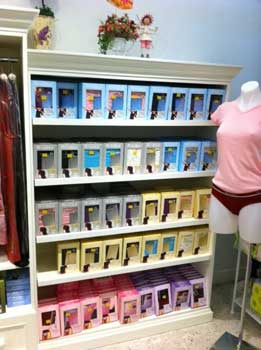 Display counter Nukleus – organic |
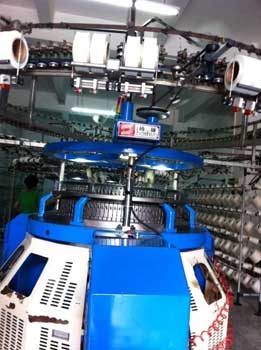 Knitting machine |
But all is not gloom and doom. There are bright spots here and there and I’d like to tell you a story about one such spot: Nukleus.
Nukleus is an international brand for men’s and women’s underwear and basics. It may not be a household name yet in Europe, but in Malaysia (where it is based), and in neighbouring countries, it is widely seen as the leader in the sustainable clothing sector. And it is actually great news that we see this leadership coming from South East Asia, where future growth in consumption will mainly take place.
In the very early days, Nukleus nearly made the same mistake as our hypothetical clothing company – it considered doing the material-and-donation routine. But to its credit, Nukleus had the humility to consult the experts, WWF Malaysia, who have to be credited with examining the issue in a holistic way.
According to C.W. Tan, the founder and CEO of Nukleus, the discussions with WWF Malaysia “sparked a paradigm shift in [their] thinking about sustainability.” He and his team learned that it is an end-to-end concept and every step along the way has environmental implications. The shift was, in fact, so great that they had to go back to the drawing board and redo virtually everything. That, in a nutshell, is how Nukleus was born.
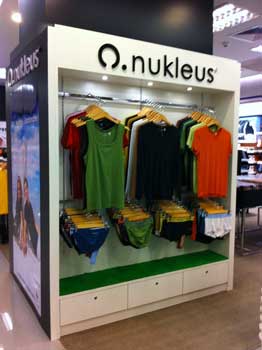 Parkson KL Festival City Setapak |
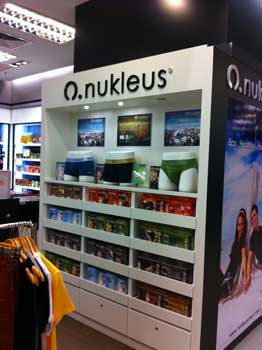 Parkson KL Festival City Setapak |
Something else came into being as a result of those discussions. Nukleus became a co-brand partner of WWF in Malaysia and Hong Kong and is contributing a part of its proceeds to aid their conservation work. This relationship is not only philanthropic but also educational in nature: WWF enlightens Nukleus on sustainability and Nukleus puts the learning into action. The two also work together to engage and collaborate with key stakeholders in fostering a sustainable future.
Today, all Nukleus products are made from the finest eco-friendly materials: GOTS-certified organic cotton yarn, and Tencel and Modal from Austria’s Lenzing Group. (GOTS, or the Global Organic Textile Standard, is the world’s leading textile processing standard for organic fibres.) Nukleus products are also manufactured under environmentally friendly and socially responsible conditions, coupled with detailed attention to the procedures in the supply chain.
On top of that, all their core components are certified Oeko-Tex Standard 100, the world’s highest standard for human ecological safety. This is a courageous and principled move. European consumers are generally familiar with the standard, but very few in Asia have heard of it. Furthermore, obtaining certification adds to the cost of business. Many businesses would have shied away from doing something with such uncertain returns. Not Nukleus. It chose to pursue certification. Tan tells me: “I have to do what is best for the consumer. I have to address the issue of unsafe chemicals through the Oeko-Tex Standard 100. Besides, what is good for humans is generally good for the environment.”
Even Nukleus’ packaging has not escaped attention. Consumers might ask, “What’s the big deal about packaging? It’s just a box!” But in the eyes of Nukleus, a box isn’t just a box. Boxes are made from paper, paper comes from trees, and trees are a vital part of the environment. Hence, the kind of box one uses for one’s packaging has environmental implications. In the case of Nukleus, it has decided to use FSC-certified paper for its packaging. The FSC, or Forest Stewardship Council, is a globally trusted organisation that promotes responsible forest management (e.g. appropriate harvesting rates and techniques, non-chemical methods of pest management, etc.). Many independent individuals and organisations – Greenpeace, WWF and renowned environmentalist Jared Diamond, among other – have endorsed this approach. In addition, vegetable-based ink is used in printing the boxes. Vegetables are renewable and therefore sustainable. Nukleus consumers are also strongly encouraged to reuse or recycle the boxes.
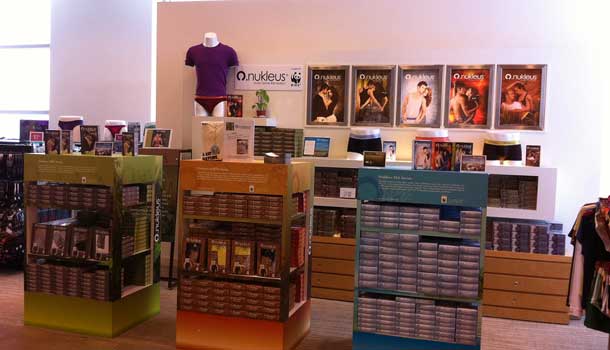
Parkson Pavilion
Moreover, Nukleus is now reaping the reards of its sustainability initiative. Its turnover in 2011 is more than three times greater than 2010, the year the brand was launched. It’s enjoying rapid expansion in its domestic retail network – from less than 10 outlets in 2010 to more than 50 at the time of writing. Things are also going well overseas. Nukleus is now available at 11 high-end department stores in neighbouring Indonesia. It’s been present in Hong Kong since the fourth quarter of 2011. And it will have a presence in Thailand and Singapore by the fourth quarter of 2012. Tan is bullish about the prospects for Nukleus. “We should be able to enter more overseas markets in the foreseeable future,” he says.
So what can businesses learn from the Nukleus story? I suggest three things.
First, sustainability is something every company should strive for. Some small-to-medium sized enterprises (or SMEs) tell me sustainability is a thing for the big boys. But that’s not true. Size does not matter. Nukleus is a small company but it didn’t use its size as an excuse to avoid going green. Hopefully, its example will inspire other SMEs to follow suit.
Second, get started. The road to sustainability is a long one. And, yes, the journey can be tough. But don’t let that scare you. There’s an old saying: “The journey of a thousand miles begins with a single step.” Just start. And in my book, a small starter is better than a non-starter, anytime. If your company hasn’t yet started, start now.
Third, get greener over time. You can start small but you cannot stay small, in terms of greenness. Consider Nukleus. It is by no means 100% sustainable. But it’s aware that there’s still room for improvement, and it’s doing something about it. The truth is, there are very few (if any) companies in this world that are 100% sustainable. Sustainability, as mentioned, is a faraway destination. Some companies may be closer to the end of their journeys, while others have some way to go. But here’s the key point: businesses should persevere and press on towards that goal – because every green step you make contributes to sustainability.
And finally over to you the consumer! You can help with judicious use of your purchasing power. Are you LOHAS (Lifestyle of Health and Sustainability) already? What a wonderful world it would be if we all bought only what is good for humans and the planet. Products that destroy would not make money any more. The choice is yours – YOU are the consumer!



